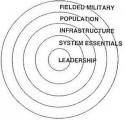Steve,
My take is that Mao et al played a number of US diplomats like harps. You don't buy that; and perhaps are among the "agrarian reformers" devotees. My take is that Ho played Patti like a harp. You don't buy that. My point on the last three sentences is that what I think and what you think mean diddly spit - what happened in China happened (and that was when I was 2 or 3).
What I did think interesting is the question of FDR's mental competence and when the slide began. He can scarcely be charged with malfeasance or non-feasance if he was not competent.
That was Hurley's point. Why obscure it with collateral arguments ?
Regards
Mike













Bookmarks